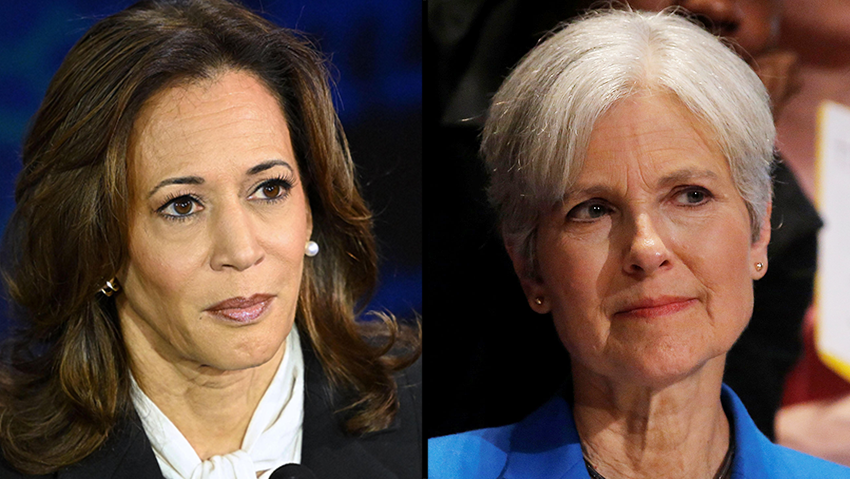Many Arab American and Muslim voters, angered by U.S. support for Israel’s war on Gaza, are abandoning Democratic candidate Kamala Harris in favor of third-party candidate Jill Stein, which could cost Harris key victories in battleground states in the November 5 election.
A late-August poll by the Council on American-Islamic Relations (CAIR) revealed that in Michigan, where there is a large Arab American population, 40% of Muslim voters supported Green Party candidate Stein. Republican Donald Trump secured 18%, while Harris, currently vice president under Joe Biden, garnered just 12%.
The poll, conducted by text message over two weeks prior to the September 10 Harris-Trump debate, showed Harris leading Trump 29.4% to 11.2%, with 34% of voters favoring third-party candidates, including Stein at 29.1%.
Harris remained the top choice for Muslim voters in Georgia and Pennsylvania, while Trump led in Nevada with 27%, narrowly surpassing Harris’ 26%. These states, along with Michigan, are crucial battlegrounds that have swung on slim margins in recent elections.
The Green Party has secured spots on most state ballots, including those in key battlegrounds, except for Georgia and Nevada, where they are pursuing legal action to be included. In Arizona and Wisconsin, also battleground states with significant Muslim populations, Stein outpolled Harris. Notably, Biden won those states in 2020 by narrow margins.
In the 2020 election, Biden was credited with winning between 64% and 84% of the Muslim vote, but support for Democrats has sharply declined since Israel’s prolonged military actions in Gaza.
The Uncommitted National Movement, a separate group, announced it would not endorse Harris despite opposing Trump, and declined to recommend voting for third-party candidates. They criticized Harris for not meeting with Palestinian Americans who lost family members in Gaza or discussing halting U.S. arms shipments to Israel. The group, which rallied over 750,000 voters to submit uncommitted ballots in the Democratic primaries to protest Biden’s policies, continues to express dissatisfaction with the current Democratic stance on Gaza.
A spokesperson for Harris’ campaign emphasized her commitment to earning every vote, uniting the country, and working to end the war in Gaza. Campaign officials responsible for Muslim outreach were unavailable for comment on the shifting political landscape.
Harris has gone further than other Biden administration officials in criticizing Israel’s actions, yet her adherence to the broader U.S. policy of providing military support to Israel has alienated many Arab American and Muslim voters.
According to the 2020 U.S. Census, around 3.5 million Americans are of Middle Eastern descent, a small percentage of the overall population. However, their votes could play a pivotal role in this tightly contested race.
Faye Nemer, founder of the Michigan-based MENA American Chamber of Commerce, noted that despite decades of community organizing and mobilization, the concerns of Arab American and Muslim voters have not been adequately addressed. “We are part of the fabric of this country, but our concerns are not considered,” she said.
Stein has been actively campaigning on the issue of Gaza, while Trump’s representatives are engaging with Muslim groups, promising to deliver peace more swiftly than Harris.
Stein, who received just over 1% of the popular vote in the 2016 election, is not expected to win in 2024. However, her positions on issues like a permanent ceasefire in Gaza, a U.S. arms embargo on Israel, and supporting student movements to divest from military investments have made her a popular figure among pro-Palestinian voters. Her running mate, Butch Ware, is a Muslim professor at the University of California, Santa Barbara.
Earlier this month, Stein addressed ArabCon in Dearborn, Michigan, an annual event for Arab Americans, and was featured on the cover of The Arab American News under the headline “The Choice 2024.” In a recent interview with The Breakfast Club, a New York-based radio show, she stated, “Every vote cast for our campaign is a vote against genocide.”
At the same time, Trump’s team has been holding in-person and virtual events with Arab American and Muslim communities in Michigan and Arizona, with former acting Director of National Intelligence Richard Grenell noting, “Arab American leaders in Detroit know this is their moment to send a powerful message to the Democrats that they cannot be taken for granted.” Trump has pledged to secure more Arab-Israeli peace deals, although it’s unclear how he would address the ongoing conflict.
In 2020, Biden won Michigan by just 154,000 votes, but in 2016, Trump defeated Hillary Clinton by fewer than 11,000 votes in the state. Michigan is home to more than 200,000 registered Muslim voters and 300,000 residents with Middle Eastern and North African ancestry.
In Philadelphia, which has a significant Black Muslim population, activists have joined the national “Abandon Harris” movement. Protests were organized during her debate with Trump last week. Rabiul Chowdhury, co-chair of CAIR’s Philadelphia chapter, remarked, “We have options. If Trump commits to ending the war and bringing home all hostages, it’s game over for Harris.”
While Trump has claimed the conflict in Gaza would not have escalated under his presidency, his support for Israel remains firm.










